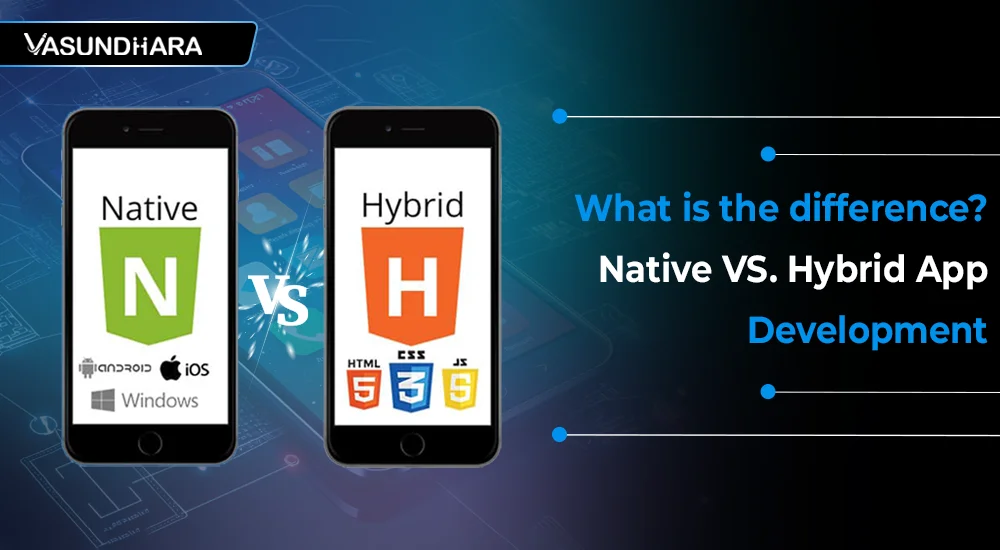What Is The Difference? Native Vs. Hybrid App Development


- Oct 26, 2024



In the world of mobile app development, businesses and developers are often faced with a crucial decision: should they choose native or hybrid app development? Both approaches have their unique strengths and weaknesses, and the decision can significantly impact the app's performance, user experience, and overall success.
As a leading app development services provider, Vasundhara Infotech specializes in both native and hybrid app development, offering businesses tailored solutions that align with their objectives. In this blog, we’ll dive deep into the differences between native and hybrid app development, exploring their benefits, drawbacks, and use cases. By the end, you’ll have a clearer understanding of which approach is right for your business needs.
A native app is a mobile application specifically developed for a particular platform, such as iOS or Android, using platform-specific programming languages like Swift for iOS and Kotlin for Android.
Native apps are optimized for performance, providing faster load times, smoother interactions, and a seamless user experience. They have full access to device features such as the camera, GPS, and notifications, making them ideal for complex, feature-rich applications.
While native apps offer superior performance and user experience, they require separate development for each platform, leading to higher development costs and longer timelines.
Built natively for both iOS and Android, WhatsApp delivers high performance, security, and a seamless user experience.
Instagram was initially developed as a native app for iOS, which helped it offer a high-quality photo-sharing experience before expanding to Android.
Also read: Best Mobile App Development Company In Surat 2024
Native app development involves creating mobile applications specifically for a particular platform—iOS or Android—using programming languages and tools that are native to that platform. This results in apps that are optimized for that operating system and can take full advantage of the device's hardware and software capabilities.
By using native technologies, developers can directly interact with the operating system and hardware, such as the camera, GPS, and other features, resulting in optimal performance.
Also read: A Digital Transformation Journey through App Development
A hybrid app is a mobile application that combines elements of both native and web technologies. Built using web languages like HTML, CSS, and JavaScript, hybrid apps run inside a native container that allows them to be deployed across multiple platforms, such as iOS and Android, using a single codebase. They can access certain device features through plugins but may not offer the same performance or user experience as fully native apps.
Hybrid apps are typically faster and more cost-effective to develop, making them ideal for simpler apps that don’t require extensive platform-specific functionality.
Uber uses a hybrid approach for its app. The core experience is seamless across platforms, but performance is slightly compromised compared to native apps.
Airbnb initially adopted a hybrid approach but eventually transitioned to native development to improve user experience and performance.
Hybrid app development allows developers to build a single app that works across multiple platforms—typically both iOS and Android. These apps are developed using web technologies like HTML, CSS, and JavaScript but are wrapped inside a native container. Hybrid apps run inside a WebView component (a browser runtime within the app) that renders the web content.
HTML5, CSS3, JavaScript.
React Native, Ionic, Flutter, PhoneGap.
Hybrid apps are ideal for companies looking for a faster development cycle while reaching a broader audience across multiple platforms. However, performance and UX might not be as high as native apps due to their reliance on WebView.
Also read: Top Mobile App Development Trends To Watch In 2024
When developing a mobile app, one of the most important decisions to make is whether to choose native or hybrid app development. Both approaches have their pros and cons, and your choice will depend on your project’s goals, budget, timeline, and target audience.
In this detailed comparison, we will explore key aspects of native and hybrid app development, helping you make an informed decision for your app development strategy.
Since native apps are developed using platform-specific languages, they are optimized for performance. They are compiled directly into machine code, which allows them to run faster and use device resources more efficiently.
Hybrid apps rely on WebView, which may cause slower performance compared to native apps.
While frameworks like React Native and Flutter have bridged the gap, hybrid apps generally don’t perform as well as native apps, especially for resource-intensive applications like 3D games or augmented reality (AR) apps.
Native development allows apps to align perfectly with platform-specific design guidelines, providing a more intuitive and consistent user experience.
The app’s look and feel can closely match the native operating system (Android or iOS), offering seamless interaction for users.
Although hybrid apps can provide a satisfactory user experience, it’s challenging to replicate the same level of fluidity and responsiveness seen in native apps.
UX discrepancies can arise due to the limitations of WebView and the challenge of creating a single design that works perfectly across multiple platforms.
Native Apps: Since native apps require separate codebases for iOS and Android, the development time and cost are typically higher. You will need to maintain two distinct teams for each platform if you want simultaneous updates and releases.
With hybrid development, a single codebase can be deployed across both platforms, significantly reducing the development time and cost.
Developers can build and maintain one app instead of two, making hybrid development more affordable for startups and small businesses.
Maintaining two separate codebases requires more time and effort. Updates and bug fixes must be implemented on both platforms independently, which can increase ongoing costs.
Since there’s only one codebase to maintain, updates and bug fixes can be rolled out faster across platforms, making maintenance easier and less time-consuming.
However, hybrid apps may face challenges when platform-specific updates are rolled out by iOS or Android, potentially leading to delayed feature implementation.
Native apps offer stronger security as they can directly integrate with platform-specific security features. They can better protect sensitive user data and offer advanced protection from vulnerabilities.
Hybrid apps may be more susceptible to security threats since they rely on web technologies.
WebView can introduce additional vulnerabilities, and developers may need to implement extra security layers to safeguard sensitive information.
Native apps have full access to all device features, including the camera, GPS, microphone, and Bluetooth. This provides developers with maximum flexibility to create feature-rich applications with deep integration into the device’s capabilities.
Although hybrid frameworks have come a long way, they still face limitations in accessing certain device features. For some advanced features, developers may need to build custom plugins, which adds to the development complexity.
Native app development is the best choice when:
If you’re developing resource-heavy apps like mobile games, AR/VR applications, or any app that requires a high level of responsiveness, native development offers better performance.
Apps where the user experience is a priority—such as e-commerce platforms or entertainment apps—often benefit from native development.
If your app needs to leverage specific features of iOS or Android devices, such as Siri, TouchID, or Google Assistant, native development is ideal.
If you have the budget for separate iOS and Android teams, native development will ensure the best performance and UX for each platform.
Also read: Top App Development Company To Work With In 2024
Hybrid app development is suitable when:
If you want to reach both iOS and Android users without developing two separate apps, hybrid development is the way to go.
If you have a limited budget or need to launch your app quickly, hybrid development can save both time and resources.
The app is content-driven: If your app is primarily focused on content delivery, such as blogs, news, or video platforms, hybrid development can provide a satisfactory experience without requiring native-level performance.
Here are some popular frameworks used for hybrid app development:
Developed by Facebook, React Native allows developers to build native-like apps using JavaScript and React. It offers excellent performance and extensive community support.
Ionic is an open source web development technology that is used to build hybrid apps. It’s known for its easy-to-use User interface components and flexibility.
Created by Google, Flutter has quickly gained popularity for its ability to build fast, natively compiled apps for mobile, web, and desktop using a single codebase.
PhoneGap (Apache Cordova): One of the earliest hybrid app frameworks, PhoneGap allows developers to build mobile apps using HTML, CSS, and JavaScript. It’s particularly useful for simple apps with basic functionality.
Also read: iOS App Development Process: A Step-by-Step Guide
Here are some frameworks and languages used for native app development:
Apple's preferred programming language for iOS development. Swift is fast, secure, and designed to work seamlessly with iOS app development frameworks.
Kotlin is Google’s official language for Android app development. It’s modern, concise, and interoperable with Java, making it a popular choice among developers.
Although Kotlin is now preferred, Java is still widely used for Android development. It’s known for its stability and vast ecosystem.
Choosing between native and hybrid app development is a crucial decision that can impact your app's performance, user experience, development time, and budget. Native apps excel in performance and user experience but require a more significant investment in both time and money. Hybrid apps, while more affordable and quicker to develop, may sacrifice some performance and platform-specific optimizations.
At the end of the day, the right choice depends on your app’s requirements, the complexity of features, and your long-term goals. Whether you need the unparalleled performance of native apps or the cost-efficiency of hybrid apps, Vasundhara Infotech, a leading mobile app development company is here to help you every step of the way.
With years of expertise in both native and hybrid mobile app development, our experienced team at Vasundhara Infotech can build custom solutions tailored to your business needs. Whether you're a startup looking for a fast, cost-effective solution, or an established business aiming for a feature-rich, high-performance app, we've got you covered.
Contact us today to bring your app idea to life and unlock the full potential of mobile technology! Let’s build something amazing together.
Copyright © 2026 Vasundhara Infotech. All Rights Reserved.